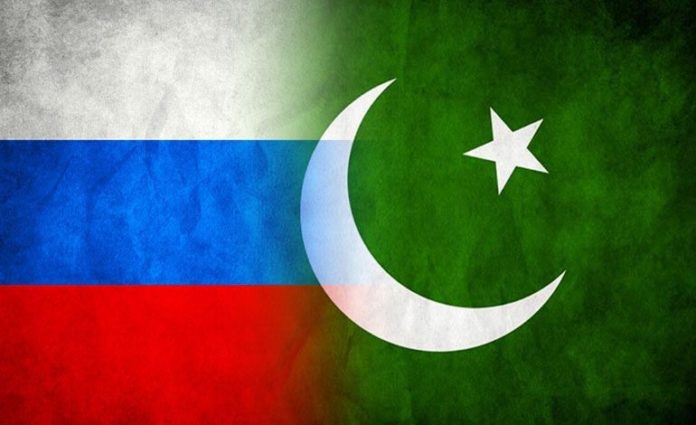New Delhi (NVI) : A few days back, Russian Ambassador to Pakistan Danila V. Ganich met Pakistan’s all-powerful Army Chief General Qamar Javed Bajwa at military headquarters in Rawalpindi.
According to Pakistani media reports, they discussed regional security situation, Afghanistan and enhanced bilateral defence cooperation.
The reports said the Russian ambassador “appreciated Pakistan’s sincere efforts for bringing peace and stability to the region, especially the Afghan peace process.”
These reported remarks by the Russian Ambassador are very significant considering the fact that the entire world has come to realise that Pakistan is the root cause of instability in this region because of its dubious role vis-a-vis terrorism and export of the scourge, particularly to Afghanistan and India.
In fact, Islamabad’s insincerity on terrorism in Afghanistan has been called out by the US, which suspended in 2018 the security assistance of about 900 million dollars which it was providing to Pakistan for cracking down on terror groups Afghan Taliban and Haqqani Group.
Frustrated by Islamabad’s double standards, the then US President Donald Trump had tweeted on January 1, 2018, “The United States has foolishly given Pakistan more than 33 billion dollars in aid over the last 15 years, and they have given us nothing but lies & deceit, thinking of our leaders as fools. They give safe haven to the terrorists we hunt in Afghanistan, with little help. No more!”
The Joe Biden administration has decided to continue with the suspension of the aid, clearly implying that Pakistan continues to support terrorism, rather than fighting against it.
India too been repeatedly amplifying how Pakistan has been a destabilising force in the region and hence the Ambassador’s comments are surprising, since Russia has been the closest ally of India for decades.
This significantly comes weeks after Russia hosted a multi-nation conference on Afghanistan in Moscow but kept India out of it, indicatively toeing Pakistan’s stand that New Delhi has no real stakes in the war-torn country to be involved in the discussions on its future.
In April this year, Russia also demonstrated a major shift in its approach when its Foreign Minister Sergey Lavrov visited India and Pakistan together, thus hyphenating the two countries for the first time despite New Delhi’s known reservations to such a step.
Crucially, in Islamabad, Lavrov said Russia was ready to supply “special military equipment” to Pakistan and hold more joint military exercises.
Russia is already in the process of supplying Mi-35 attack helicopters to Pakistan, which is looking forward to firming up of a Strategic Partnership between the two countries.
Two years back, Russia also held joint military exercises with Pakistan, for the first time in Pakistan.
These are some of the instances which indicate that Russia, our closest ally, is moving closer and closer to our hostile neighbour, Pakistan.
Now, with the US in the process of leaving Afghanistan by September 11 this year, it provides another opportunity to Russia to work with Pakistan, which has been playing brinkmanship in Afghanistan.
Though neither government would admit it, the warmth in Moscow for New Delhi began to fade after India signed civil nuclear deal with the US in 2005.
The historic agreement, which led to an end to India’s global isolation in the civil nuclear field, was associated with certain other critical developments like New Delhi going in for increasing number of defence deals with the US.
Till then, Russia, (or erstwhile USSR) was the mainstay of India’s defence purchases, with almost the entire military inventory coming from that country.
Although India maintained that its growing relations with the US would not be at the cost of its “traditionally-tested” ties with Russia, there was visibly unease in Moscow and it was conveyed in some ways.
In October 2007, there were reports that the then External Affairs of India Pranab Mukherjee was frisked at the Moscow Airport against protocol when he went there on an official visit.
Also, during that trip, the Russian leadership gave a cold shoulder to Mukherjee, with neither Foreign Minister Sergei Lavrov meeting him nor President Vladimir Putin giving him an audience.
It was also during that period that differences mounted between India and Russia over the cost to be paid by New Delhi for purchase of refurbished Admiral Gorshkov, which was a defunct aircraft carrier of Russia and then was renamed as INS Vikramaditya after induction in the Indian Navy.
The deal was signed for $974 million between the two countries in 2004 under the NDA government but Russia later demanded higher price and finally India had to shell out $2.35 billion in 2010 under the UPA government.
If these instances, along with a number of other developments, are taken into consideration, it may be concluded that Russia, the best friend of India, is drifting away towards our hostile neighbour Pakistan.







